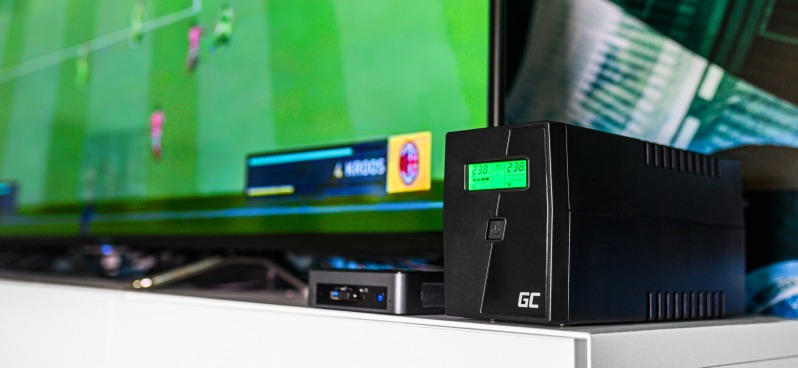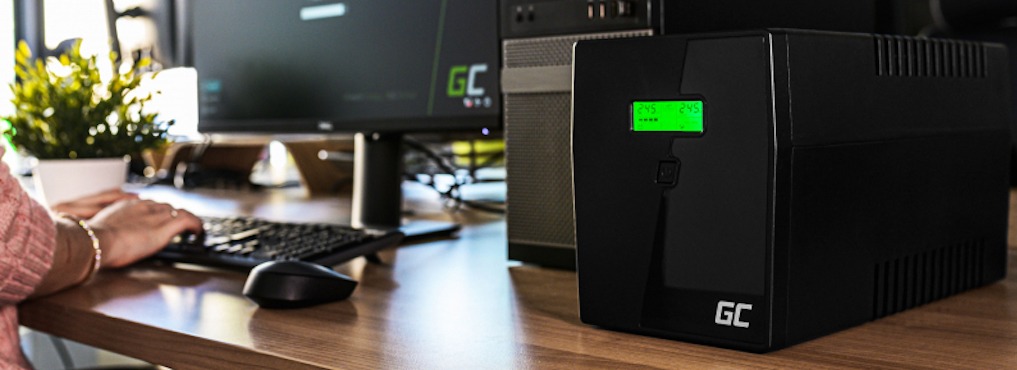In mid-March 2020 our lives were dramatically transformed by an event beyond our control. The quickly spreading COVID-19 pandemic soon resulted in a national lockdown. Once most offices were effectively locked down, it was necessary to adjust to a new reality, which involved working from home. And this is when such devices as UPS became increasingly popular. What is it and why is it good to get one? We will answer these questions below!
In this article you will find out:
- why you should buy a UPS,
- what types of UPS are available,
- what to look out for when choosing UPS.
UPS – what exactly is it?
Some of us may not realise what UPS is and why it’s good to have one in your home office. Name is short for “Uninterruptible power supply.” These devices are designed to keep your computer equipment “alive” when the input power source or mains power fails. In brief, UPS offers energy supply to electric and electronic equipment if the connection to the primary power supply is lost (e.g. if there is a blackout in your area). Device can provide from 5 minutes to a few dozen hours of backup power. The parameters may vary depending on the battery capacity or the load placed on the UPS.
Such devices are used mainly to supply power to computers and servers, but some are also used in health care. Below we will offer a few hints on how to choose the best UPS and what to look out for. UPS systems connected to a computer, server or grid may alert the owner of the device of upcoming problems with power supply. In the event of servers the most popular practice in order to prevent data loss is automatic lockdown of operational systems (switching off the computer).
Device will usually provide one-phase voltage of 230 V. It’s good to know there are also three-phase UPS systems with the voltage of 400V. UPS can take over the role of output sockets and sustain power supply also in the event of long-lasting and major voltage fluctuations. When there is electric current in the socket, the UPS system will accumulate the energy and offer relevant protection in the event of overvoltage.

Types of UPS systems – online, offline, line interactive
UPS systems come in four main types. The first one is online UPS – its key features include:
- high resilience in case of input voltage interruptions,
- constant output voltage (uninterrupted supply),
- integrated system for improving the power factor (reducing losses in transmission lines).
Unfortunately, the solution has some downsides as well:
- it’s noisy,
- the initial cost is higher,
- the operating temperature is higher, which affects the running costs of the device and the need for additional cooling.
Some of these issues will not be observed in offline UPS, whose key features include:
- simpler construction (lower initial expense and fewer elements that may break down),
- better durability (as a result of lower operating temperature)
- and silent operation (contrary to online UPS, this one only operates in emergency rather than round the clock).
It’s also good to have a look at the remaining two types: line interactive and line interactive AVR. The former is an improved version of offline UPS, with the possibility to use the inverter transformer both during battery-assisted operation and when the battery needs to be replenished while the device operates on mains. The acronym in the latter type can be explained as “Automatic Voltage Regulator”. In the event of constant voltage fluctuations (when the voltage goes up or down), this UPS system can maintain nominal output voltage without having to resort to battery-assisted mode.


Advantages of having a UPS system at home. Why You should buy a UPS?
Why is it good to get hold of a UPS system when you’re working from home? The answer to this question is rather easy – companies realise that sudden power cuts can be disastrous for the data stored in computers, which is why they implement a series of safeguards to prevent such problems. While you work from home, you don’t have access to this protection and you’re left to your own devices in regards to taking care of your equipment and the results of your work.
UPS will protect you from losing valuable files. With such backup you can easily save your work and close down your computer without having to worry about the consequences. Pure sine wave (also known as full sine wave, commonly used for line voltage) in a UPS system is the safest option, because this is the current in European sockets.
What type of UPS to choose for your computer? The best UPS for home use
How to choose the best UPS? What should it have? It’s good to consider a few important parameters:
- UPS rating power,
- output voltage,
- energy consumption,
- back-up time,
- power consumption
- or number of devices you can connect to the UPS system (compatibility with a specific number of output ports).
Another important thing is the transfer time – this parameter means how fast your UPS system will respond in the event of a blackout (the lower this value is, the better).


Conclusion
As you can see from the article, you shouldn’t underestimate the role of UPS in your home office. Especially when you can’t rely on the support offered by your company and you’re the only one responsible for saving the outcome of your work in the event of a sudden blackout. Among UPS systems you will find various types and models, which means you can choose one that suits your needs best.
Although it’s not easy to pick the right UPS, a good model can be crucial for your work. You wouldn’t like to lose the results of your effort because of a plain power cut. It’s as if you switched your PC off without saving your work. A properly chosen UPS with relevant power will keep your computer going for a couple of minutes, which is just enough to save whatever you’ve been working on and switch off any connected devices (PC, laptop etc.).
Veronica Jones
Related posts
Most viewed entries
- Polish Inventors Who Changed the World – Do You Know Them All?
- The Scariest Myths About Electronic Devices – Halloween 2024
- The history of bicycle – International Bicycle Day
- Electricity in a camper van on holiday – a conundrum easily solve
- Off-grid installation on a plot. Is it worth it?
- Charging your electric car at home without a wallbox

